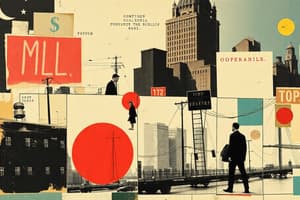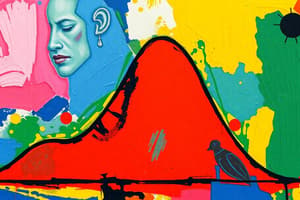Podcast
Questions and Answers
When should you decide to go to a movie?
When should you decide to go to a movie?
If the marginal benefit of the movie exceeds its marginal cost.
When should a person consume more of something?
When should a person consume more of something?
When its marginal benefit exceeds its marginal cost.
What is an economic hypothesis?
What is an economic hypothesis?
A possible explanation of cause and effect.
How is opportunity cost best defined?
How is opportunity cost best defined?
What is the term for the pleasure, happiness, or satisfaction received from a product in economics?
What is the term for the pleasure, happiness, or satisfaction received from a product in economics?
Rational behavior implies that everyone will make identical choices.
Rational behavior implies that everyone will make identical choices.
What does a point inside the production possibilities curve indicate?
What does a point inside the production possibilities curve indicate?
What does the production possibilities curve tell us?
What does the production possibilities curve tell us?
What does the assertion "There is no free lunch" mean?
What does the assertion "There is no free lunch" mean?
What best answers the question, 'What goods and services will be produced?' in a market system?
What best answers the question, 'What goods and services will be produced?' in a market system?
How does human specialization, or the division of labor, affect output?
How does human specialization, or the division of labor, affect output?
What characterizes the market system?
What characterizes the market system?
What does the 'coincidence of wants' problem associated with barter refer to?
What does the 'coincidence of wants' problem associated with barter refer to?
What is the market system's answer to the question, 'How will the system accommodate change?'?
What is the market system's answer to the question, 'How will the system accommodate change?'?
What does the invisible hand concept suggest?
What does the invisible hand concept suggest?
What does 'consumer sovereignty' mean?
What does 'consumer sovereignty' mean?
What is the market system's answer to the question, 'How will the goods and services be produced?'?
What is the market system's answer to the question, 'How will the goods and services be produced?'?
What does the simple circular flow diagram show?
What does the simple circular flow diagram show?
Broadly defined, what does competition involve?
Broadly defined, what does competition involve?
Flashcards
Marginal Benefit vs. Marginal Cost
Marginal Benefit vs. Marginal Cost
The benefit gained from consuming one more unit of a product, where it exceeds the cost incurred for that additional unit.
Economic Hypothesis
Economic Hypothesis
A possible explanation for the relationship between cause and effect, often used to test economic theories.
Opportunity Cost
Opportunity Cost
The value of the next best alternative that is given up when producing one more unit of a good.
Utility
Utility
Signup and view all the flashcards
Rational Behavior
Rational Behavior
Signup and view all the flashcards
Production Possibilities Curve
Production Possibilities Curve
Signup and view all the flashcards
Inefficient Production
Inefficient Production
Signup and view all the flashcards
There is No Free Lunch
There is No Free Lunch
Signup and view all the flashcards
Profitability Drives Production
Profitability Drives Production
Signup and view all the flashcards
Specialization and Division of Labor
Specialization and Division of Labor
Signup and view all the flashcards
Private Property Rights
Private Property Rights
Signup and view all the flashcards
Coincidence of Wants
Coincidence of Wants
Signup and view all the flashcards
Market Adaptability
Market Adaptability
Signup and view all the flashcards
Invisible Hand
Invisible Hand
Signup and view all the flashcards
Consumer Sovereignty
Consumer Sovereignty
Signup and view all the flashcards
Cost-Efficiency Production
Cost-Efficiency Production
Signup and view all the flashcards
Circular Flow Diagram
Circular Flow Diagram
Signup and view all the flashcards
Competition
Competition
Signup and view all the flashcards
Study Notes
Decision-Making in Economics
- Choose to attend a movie when its marginal benefit surpasses its marginal cost.
- Increase consumption of a product when its marginal benefit is greater than its marginal cost.
Economic Concepts
- An economic hypothesis provides a possible explanation of the relationship between cause and effect.
- Opportunity cost represents the value of the next best alternative given up to produce one more unit of a different product.
Utility and Rational Behavior
- Utility is the satisfaction or pleasure derived from consuming a product.
- Rational behavior doesn't imply identical choices among individuals.
Production Possibilities
- Points within the production possibilities curve indicate attainable but inefficient use of resources.
- The curve illustrates the maximum combinations of two goods that can be produced with societal resources.
Scarcity and Choices
- The phrase "There is no free lunch" emphasizes that all production requires the use of scarce resources, necessitating sacrifices of alternatives.
- Goods and services produced in a market system are those deemed profitable.
Specialization and Market Characteristics
- Human specialization or division of labor boosts output by leveraging differences in worker skills.
- The market system is marked by private property rights.
Barter and Exchange
- The "coincidence of wants" challenge in barter requires sellers to possess goods desired by buyers for successful exchange.
Market System Dynamics
- The market's response to accommodating change relies on price guiding functions and profit incentives.
- The invisible hand suggests that competitive forces align private interests with public good.
Consumer Influence and Production Methods
- Consumer sovereignty indicates buyers dictate production through their demand expressed via "dollar votes."
- The market system addresses how goods and services are produced by prioritizing least-cost production techniques.
Circular Flow in Economy
- The simple circular flow diagram demonstrates that households act as sellers in the resource market and buyers in the product market.
- Competition in a broad sense entails the existence of independently acting buyers and sellers, alongside market freedom.
Studying That Suits You
Use AI to generate personalized quizzes and flashcards to suit your learning preferences.




